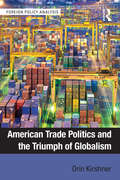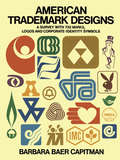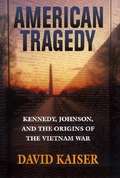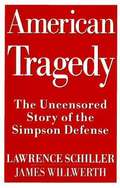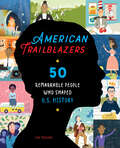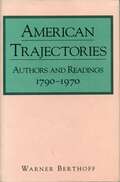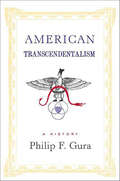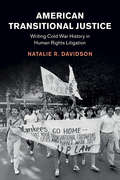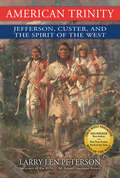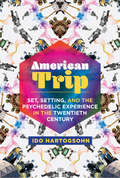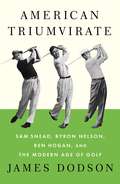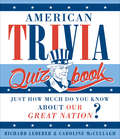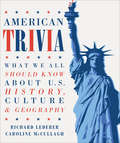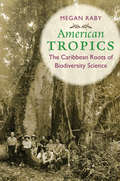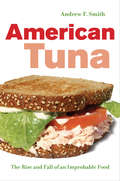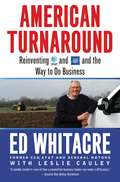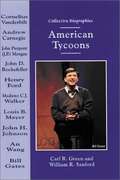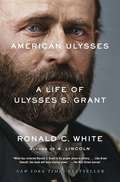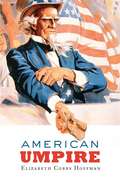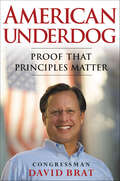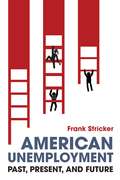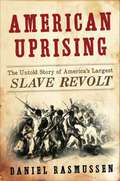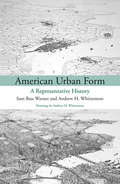- Table View
- List View
American Trade Politics and the Triumph of Globalism (Foreign Policy Analysis)
by Orin KirshnerA deep and unresolved tension exists within American trade politics between the nation’s promotion of an open world trading system and the operations of its democratic domestic political regime. Whereas most scholarly attention has focused on how domestic politics has interfered with the United States’ global economic leadership, Orin Kirshner offers here an analysis of the ways in which U.S. leadership in the arena of global trade has affected American democracy and the domestic political regime. By participating in multilateral trade agreements, the U.S. Congress has transferred its trade policymaking authority to the president and, through international trade negotiations, from the American state to the GATT/WTO regime. This reorganization of policymaking authority has resulted in the "triumph of globalism," and fundamentally alters the citizen-state relationship assumed in democratic theory. Kirshner illustrates this process through four case studies: The Reciprocal Trade Agreements Act of 1945, The Trade Expansion Act of 1962, The Trade Act of 1974, The Omnibus Trade and Competitiveness Act of 1988, and further examines the impact of the Uruguay Round Agreements Act of 1994 on the political and institutional structure of American trade politics up to the current period. American Trade Politics and the Triumph of Globalism makes a significant contribution to the study of both international trade and domestic American politics. This is essential reading for students and scholars of trade policy, international political economy, American politics, and democratic theory.
American Trademark Designs
by Barbara Baer CapitmanArranged by category, these 732 American trademarks and symbols represent a variety of fields, including entertainment, education, real estate, insurance, food and beverages, retail, transportation, utilities, and heavy industry. The black-and-white images feature captions that identify the trademark, the year of design, and -- when known -- the designer's name.
American Tragedy: Kennedy, Johnson, and the Origins of the Vietnam War
by David E. KaiserFought as fiercely by politicians and the public as by troops in Southeast Asia, the Vietnam War--its origins, its conduct, its consequences--is still being contested. In what will become the classic account, based on newly opened archival sources, David Kaiser rewrites what we know about this conflict. Reviving and expanding a venerable tradition of political, diplomatic, and military history, he shows not only why we entered the war, but also why our efforts were doomed to fail. American Tragedy is the first book to draw on complete official documentation to tell the full story of how we became involved in Vietnam--and the story it tells decisively challenges widely held assumptions about the roles of Eisenhower, Kennedy, and Johnson. Using an enormous range of source materials from these administrations, Kaiser shows how the policies that led to the war were developed during Eisenhower's tenure and nearly implemented in the closing days of his administration in response to a crisis in Laos; how Kennedy immediately reversed course on Laos and refused for three years to follow recommendations for military action in Southeast Asia; and how Eisenhower's policies reemerged in the military intervention mounted by the Johnson administration. As he places these findings in the context of the Cold War and broader American objectives, Kaiser offers the best analysis to date of the actual beginnings of the war in Vietnam, the impact of the American advisory mission from 1962 through 1965, and the initial strategy of General Westmoreland. A deft re-creation of the deliberations, actions, and deceptions that brought two decades of post-World War II confidence to an ignominious end, American Tragedy offers unparalleled insight into the Vietnam War at home and abroad--and into American foreign policy in the 1960s.
American Tragedy: The Uncensored Story of the Simpson Defense
by Lawrence Schiller James WillwerthThis book is a factual account of the defense of O.J. Simpson and is directly based on personal interviews, documents, court transcripts, and other material I obtained while researching this work. More than two dozen people involved in this case were interviewed, fifteen face to face, in 196 separate conversations. Nine subjects sat with me for more than fourteen hours each. The transcripts of my interviews total more than 23,000 pages. The information for this book comes from the collected memories of those interviewed and from my own observations since the early days of the case. As I have noted elsewhere in this book, I began my formal interviews in September 1995. In most cases the people I interviewed kept personal notes and diaries from the first days of their involvement in the case, and their memories were supported by these notes and other written material. Quotations from interviews have received limited editing merely to ensure a smooth transition from spoken to written form.Trial transcripts and other printed material have also been edited to a very limited degree, and I have tried to include the usual conventions of ellipses and brackets wherever possible.When any editing has been done, no material changes in meaning have been made. Quotation marks are sometimes used where conversations have been reconstructed from memory. In such instances, at least one of the participants has confirmed the substance of the conversation. On occasions when I have described conversations of which the memory of one participant may differ from others' in a material respect, the substance has been confirmed by a number of those present. Since this is a book about the Simpson defense, I have not attempted to interview the prosecution team, some of whom have published or will publish their own books and would have been understandably reluctant to share sensitive strategies with me. --LAWRENCE SCHILLER
American Trailblazers: 50 Remarkable People Who Shaped U.S. History
by Lisa TrusianiDiscover the amazing stories of 50 real American heroes—a history book for kids ages 9 to 12 Are you ready to read about daring deeds and world-changing events? Meet the American Trailblazers, diverse historical and modern figures who accomplished incredible things. History books for kids age 9-12 should include a range of people and stories—here you'll learn about the greats in sports, civil rights, art, science, and more. Explore each person's groundbreaking life and find the details of their work in the vibrant illustrations. Unlike other history books for kids age 9-12, American Trailblazers also includes activities and tips for exploring more online. This standout among history books for kids age 9-12 introduces: Athletes and performers—Meet memorable stars of sports and stage like baseball player Roberto Clemente, boxing champion Muhammad Ali, and entertainer and activist Josephine Baker. Scientists and explorers—Read about the epic undertakings of engineer Nikola Tesla, interpreter and expedition guide Sacagawea, and conservationist John Muir. Rebels and writers—Hear the powerful principles of jazz poet Langston Hughes, Supreme Court justice Ruth Bader Ginsburg, and author and voting rights organizer Louisa May Alcott. Some are famous, but many you won't read about in other history books for kids age 9-12. Who will your new hero be? Find out in American Trailblazers—all history books for kids age 9-12 should be this inspiring!
American Trajectories: Authors and Readings, 1790–1970
by Warner BerthoffIn American Trajectories Warner Berthoff argues that even in the broadest cultural and historical perspective, imaginative literature (like all the arts) is a matter of individual signatures and differences. He also puts forth that there are recognizable patterns and continuities marking off what is distinctively American, what both reflects and speaks for a shared national experience. Discussions of Emily Dickinson and Mark Twain, Scott Fitzgerald and Ernest Hemingway, Kate Chopin, Theodore Dreiser, and Edmund Wilson focus on the provenance and central character of writing by mainstream figures in our literary past. The essays on Brockden Brown, Nathan Asch, O. Henry, Frank O'Hara, Lewis Mumford, and Van Wyck Brooks highlight marginal, neglected, forgotten, or not yet fully acknowledged contributors to American writing.
American Trajectories: Authors and Readings, 1790–1970 (G - Reference, Information and Interdisciplinary Subjects)
by Warner BerthoffIn American Trajectories Warner Berthoff argues that even in the broadest cultural and historical perspective, imaginative literature (like all the arts) is a matter of individual signatures and differences. He also puts forth that there are recognizable patterns and continuities marking off what is distinctively American, what both reflects and speaks for a shared national experience. Discussions of Emily Dickinson and Mark Twain, Scott Fitzgerald and Ernest Hemingway, Kate Chopin, Theodore Dreiser, and Edmund Wilson focus on the provenance and central character of writing by mainstream figures in our literary past. The essays on Brockden Brown, Nathan Asch, O. Henry, Frank O'Hara, Lewis Mumford, and Van Wyck Brooks highlight marginal, neglected, forgotten, or not yet fully acknowledged contributors to American writing.
American Transcendentalism: A History
by Philip F. GuraThe first comprehensive history of the nineteenth-century American intellectual movement.American Transcendentalism is a comprehensive narrative history of America’s first group of public intellectuals, the men and women who defined American literature and indelibly marked American reform in the decades before and following the America Civil War. Philip F. Gura masterfully traces their intellectual genealogy to transatlantic religious and philosophical ideas, illustrating how these informed the fierce local theological debates that, so often first in Massachusetts and eventually throughout America, gave rise to practical, personal, and quixotic attempts to improve, even perfect the world. The transcendentalists would painfully bifurcate over what could be attained and how, one half epitomized by Ralph Waldo Emerson and stressing self-reliant individualism, the other by Orestes Brownson, George Ripley, and Theodore Parker, emphasizing commitment to the larger social good.By the 1850s, the uniquely American problem of slavery dissolved differences as transcendentalists turned ever more exclusively to abolition. Along with their early inheritance from European Romanticism, America’s transcendentalists abandoned their interest in general humanitarian reform. By war’s end, transcendentalism had become identified exclusively with Emersonian self-reliance, congruent with the national ethos of political liberalism and market capitalism.
American Transitional Justice: Writing Cold War History in Human Rights Litigation (Human Rights in History)
by Natalie R. DavidsonNatalie Davidson offers an alternative account of Alien Tort Statute litigation by revisiting the field's two seminal cases, Filártiga (filed 1979) and Marcos (filed 1986), lawsuits ostensibly concerned with torture in Paraguay and the Philippines, respectively. Combining legal analysis, archival research and ethnographic methods, this book reveals how these cases operated as transitional justice mechanisms, performing the transition of the United States and its allies out of the Cold War order. It shows that US courts produced a whitewashed history of US involvement in repression in the Western bloc, while in Paraguay and the Philippines the distance from US courts allowed for a more critical narration of the lawsuits and their underlying violence as symptomatic of structural injustice. By exposing the political meanings of these legal landmarks for three societies, Davidson sheds light on the blend of hegemonic and emancipatory implications of international human rights litigation in US courts.
American Trinity: Jefferson, Custer, and the Spirit of the West
by Larry Len PetersonAmerican Trinity is for everyone who loves the American West and wants to learn more about the good, the bad, and the ugly. It is a sprawling story with a scholarly approach in method but accessible in manner. In this innovative examination, Dr. Larry Len Peterson explores the origins, development, and consequences of hatred and racism from the time modern humans left Africa 100,000 years ago to the forced placement of Indian children on off-reservation schools far from home in the late 1800s. Along the way, dozens of notable individuals and cultures are profiled. Many historical events turned on the lives of legendary Americans like the "Father of the West," Thomas Jefferson, and the "Son of the West," George Armstrong Custer - two strange companions who shared an unshakable sense of their own skills - as their interpretation of truths motivated them in the winning of the West.Dr. Peterson reveals how anti-Indian sentiments were always only obliquely about them. They were victims but not the cause. The Indian was a symbol, not a real person. The politics of hate and racism directed toward them was also experienced in prior centuries by Jews, enslaved Africans, and other Christians. Hatred and racism, when taken into the public domain, are singularly difficult to justify, which is why Europeans and Americans have always sought vindication from the highest sources of authority in their cultures. In the Middle Ages it was religion supplemented later by the philosophy of the Enlightenment. In nineteenth-century Europe and America, religion and philosophy were joined by science and medicine to support Manifest Destiny, scientific racism, and social Darwinism, all of which had profound consequences on Native Americans and the Spirit of the West.Presenting research in anthropology, archaeology, biology, history, law, medicine, religion, philosophy, and psychology, Dr. Peterson provides the latest observations that delineate why the Native American's life was destroyed. American Trinity is a stunning portrait, a view at once unique, panoramic, and intimate. It is a fascinating book that will make you think about the differences between belief and knowledge; about the self-skepticism of science and medicine; and about what aspects of the world we take on faith.
American Trip: Set, Setting, and the Psychedelic Experience in the Twentieth Century
by Ido HartogsohnHow historical, social, and cultural forces shaped the psychedelic experience in midcentury America, from CIA experiments with LSD to Timothy Leary's Harvard Psilocybin Project.Are psychedelics invaluable therapeutic medicines, or dangerously unpredictable drugs that precipitate psychosis? Tools for spiritual communion or cognitive enhancers that spark innovation? Activators for one's private muse or part of a political movement? In the 1950s and 1960s, researchers studied psychedelics in all these incarnations, often arriving at contradictory results. In American Trip, Ido Hartogsohn examines how the psychedelic experience in midcentury America was shaped by historical, social, and cultural forces--by set (the mindset of the user) and setting (the environments in which the experience takes place).
American Triumvirate: Sam Snead, Byron Nelson, Ben Hogan, and the Modern Age of Golf
by James DodsonIn this celebration of three legendary champions on the centennial of their births in 1912, one of the most accomplished and successful writers about the game explains the circumstances that made each of them so singularly brilliant and how they, in turn, saved not only the professional tour but modern golf itself, thus making possible the subsequent popularity of players from Arnold Palmer to Tiger Woods. During the Depression—after the exploits of Walter Hagen and Gene Sarazen and Bobby Jones (winning the Grand Slam as an amateur in 1930) had faded in the public’s imagination—golf’s popularity fell year after year, and as a spectator sport it was on the verge of extinction. This was the unhappy prospect facing two dirt-poor boys from Texas and another from Virginia who had dedicated themselves to the game yet could look forward only to eking out a subsistence living along with millions of other Americans. But then lightning struck, and from the late thirties into the fifties these three men were so thoroughly dominant—each setting a host of records—that they transformed both how the game was played and how society regarded it. Sports fans in general are well aware of Hogan and Nelson and Snead, but even the most devoted golfers will learn a great many new things about them here. Their hundredth birthdays will be commemorated throughout 2012—Nelson born in February, Snead in May, and Hogan in August—but as this comprehensive and compelling account vividly demonstrates, they were, and will always remain, a triumvirate for the ages.
American Trivia Quiz Book
by Richard Lederer Caroline McCullaghTest your knowledge of our great nation with this comprehensive volume of United States trivia, complete with quizzes to challenge—and stump—your friends.These days, many Americans are more familiar with The Simpsons than they are with American presidents. So historian Richard Lederer and author Caroline McCullagh have decided to put their fellow American to the test with the American Trivia Quiz Book.This entertaining volume brims with fascinating facts about the people, places, and events that make our nation great, with a series of fun and informative quizzes on subjects ranging from Columbus to baseball. There are questions about presidents and first ladies, explorers and inventors, heroes and poets, and much more.
American Trivia: What We Should All Know About U.S. History, Culture & Geography
by Richard Lederer Caroline McCullaghLearn fascinating facts about the history, culture, leaders, and heroes of our great nation in this comprehensive volume of U.S. trivia.This land is your land—so you should know a thing or two about it. American Trivia is chock full of fascinating facts, historical riddles, and puzzling quizzes about the people, places, and events that make this nation great. Divided into sections on national origins, presidents, historical figures, and more, this book offers a crash course in essential Americana. In these pages, you will learn the origin of the national anthem, stories about national monuments such as the Liberty Bell and Statue of Liberty, fascinating information about the country&’s heroes and inventors, and more. As co-authors Richard Lederer and Caroline McCullagh demonstrate, American trivia is anything but trivial.
American Tropics: The Caribbean Roots of Biodiversity Science (Flows, Migrations, and Exchanges)
by Megan RabyBiodiversity has been a key concept in international conservation since the 1980s, yet historians have paid little attention to its origins. Uncovering its roots in tropical fieldwork and the southward expansion of U.S. empire at the turn of the twentieth century, Megan Raby details how ecologists took advantage of growing U.S. landholdings in the circum-Caribbean by establishing permanent field stations for long-term, basic tropical research. From these outposts of U.S. science, a growing community of American "tropical biologists" developed both the key scientific concepts and the values embedded in the modern discourse of biodiversity.Considering U.S. biological fieldwork from the era of the Spanish-American War through the anticolonial movements of the 1960s and 1970s, this study combines the history of science, environmental history, and the history of U.S.–Caribbean and Latin American relations. In doing so, Raby sheds new light on the origins of contemporary scientific and environmentalist thought and brings to the forefront a surprisingly neglected history of twentieth-century U.S. science and empire.
American Tuna
by Andrew F. SmithIn a lively account of the American tuna industry over the past century, celebrated food writer and scholar Andrew F. Smith relates how tuna went from being sold primarily as a fertilizer to becoming the most commonly consumed fish in the country. In American Tuna, the so-called "chicken of the sea" is both the subject and the backdrop for other facets of American history: U.S. foreign policy, immigration and environmental politics, and dietary trends. Smith recounts how tuna became a popular low-cost high-protein food beginning in 1903, when the first can rolled off the assembly line. By 1918, skyrocketing sales made it one of America's most popular seafoods. In the decades that followed, the American tuna industry employed thousands, yet at at mid-century production started to fade. Concerns about toxic levels of methylmercury, by-catch issues, and over-harvesting all contributed to the demise of the industry today, when only three major canned tuna brands exist in the United States, all foreign owned. A remarkable cast of characters-- fishermen, advertisers, immigrants, epicures, and environmentalists, among many others--populate this fascinating chronicle of American tastes and the forces that influence them.
American Turnaround: Reinventing AT&T and GM and the Way We Do Business in the USA
by Leslie Cauley Edward WhitacreEd Whitacre is credited with taking over the corporate reins at General Motors (GM) when the automotive manufacturer was on the brink of bankruptcy during 2009 and turned the company around in magnificent fashion. In this business memoir, the native Texan explores his unique management style, business acumen and patriotism.It was President Obama who reached out to Ed Whitacre to come out of retirement and take over GM in 2009. A down-to-earth, no-nonsense Texas native with a distinctive Texas twang in his voice, Whitacre was reluctant to come out of retirement to work at GM. But Whitacre is that rare CEO with great charisma and extraordinary management instincts. And when he got to Detroit, he started to whittle down the corporate bureaucracy right away - and got GM back on track in record timeBefore being pulled out of retirement to run GM by Obama, Ed Whitacre had spent his entire corporate career in the telecom business, where he ultimately ended up running AT&T.
American Tycoons (Collective Biographies)
by Carl R. Green William R. SanfordEach book presents ten short biographies of important people for the price of a single volume. - This series includes books that are organized around interesting themes, highlight possible career choices, and include women and minorities.
American Ulysses: A Life of Ulysses S. Grant
by Ronald C. WhiteNEW YORK TIMES BESTSELLER • From the author of A. Lincoln, a major new biography of one of America’s greatest generals—and most misunderstood presidentsFinalist for the Gilder-Lehrman Military History Book Prize In his time, Ulysses S. Grant was routinely grouped with George Washington and Abraham Lincoln in the “Trinity of Great American Leaders.” But the battlefield commander–turned–commander-in-chief fell out of favor in the twentieth century. In American Ulysses, Ronald C. White argues that we need to once more revise our estimates of him in the twenty-first. Based on seven years of research with primary documents—some of them never examined by previous Grant scholars—this is destined to become the Grant biography of our time. White, a biographer exceptionally skilled at writing momentous history from the inside out, shows Grant to be a generous, curious, introspective man and leader—a willing delegator with a natural gift for managing the rampaging egos of his fellow officers. His wife, Julia Dent Grant, long marginalized in the historic record, emerges in her own right as a spirited and influential partner. Grant was not only a brilliant general but also a passionate defender of equal rights in post-Civil War America. After winning election to the White House in 1868, he used the power of the federal government to battle the Ku Klux Klan. He was the first president to state that the government’s policy toward American Indians was immoral, and the first ex-president to embark on a world tour, and he cemented his reputation for courage by racing against death to complete his Personal Memoirs. Published by Mark Twain, it is widely considered to be the greatest autobiography by an American leader, but its place in Grant’s life story has never been fully explored—until now. One of those rare books that successfully recast our impression of an iconic historical figure, American Ulysses gives us a finely honed, three-dimensional portrait of Grant the man—husband, father, leader, writer—that should set the standard by which all future biographies of him will be measured.
American Umpire
by Elizabeth Cobbs HoffmanCommentators frequently call the United States an empire: occasionally a benign empire, sometimes an empire in denial, and often a destructive empire. Elizabeth Cobbs Hoffman asserts instead that, because of its unusual federal structure, America has performed the role of umpire since 1776, compelling adherence to rules that gradually earned collective approval. This provocative reinterpretation traces America’s role in the world from the days of George Washington, Abraham Lincoln, and Franklin D. Roosevelt to the present. Cobbs Hoffman argues that the United States has been the pivot of a transformation that began outside its borders and before its founding, in which nation-states replaced the empires that had dominated history. The “Western” values that America is often accused of imposing were, in fact, the result of this global shift. American Umpire explores the rise of three values-access to opportunity, arbitration of disputes, and transparency in government and business-and finds that the United States is distinctive not in its embrace of these practices but in its willingness to persuade and even coerce others to comply. But America’s leadership is problematic as well as potent. The nation has both upheld and violated the rules. Taking sides in explosive disputes imposes significant financial and psychic costs. By definition, umpires cannot win. American Umpire offers a powerful new framework for reassessing the country’s role over the past 250 years. Amid urgent questions about future choices, this book asks who, if not the United States, might enforce these new rules of world order?
American Underdog: Proof That Principles Matter
by David BratFrom David Brat, the college professor who made political headlines when he unseated Majority Leader Eric Cantor, comes his plan for restoring fiscal liberty for America.Congressman David Brat's odds-defying win against Eric Cantor -- a triumph of a modest $200,000 campaign fund against a $5 million war chest -- immediately brought David Brat, heretofore a liberal arts college economics professor, into the political limelight. Now, in his first book, American Underdog, Brat examines how we brought down the status quo by tapping into moral and economic lessons as old as our civilization and discusses how Washington can learn from history instead of ignoring it. A fighter for children, he illuminates how our current fiscal policies are selling their future, and outlines new ways to move forward with a conservative agenda that provides fairer treatment for all.
American Unemployment: Past, Present, and Future
by Frank StrickerThe history of unemployment and many concepts surrounding it remain a mystery to many Americans. Frank Stricker believes we need to understand this essential thread in our shared past. American Unemployment is an introduction for everyone that takes aim at misinformation, willful deceptions, and popular myths to set the record straight: <P><P> Workers do not normally choose to be unemployed. In our current system, persistent unemployment is not an aberration. It is much more common than full employment, and the outcome of elite policy choices. Labor surpluses propped up by flawed unemployment numbers have helped to keep real wages stagnant for more than forty years. Prior to the New Deal and the era of big government, laissez-faire policies repeatedly led to depressions with heavy, even catastrophic, job losses. Undercounting the unemployed sabotages the creation of government job programs that can lead to more high-paying jobs and full employment. <P><P> Written for non-economists, American Unemployment is a history and primer on vital economic topics that also provides a roadmap to better jobs and economic security.
American Uprising: The Untold Story of America's Largest Slave Revolt
by Daniel Rasmussen&“A chilling and suspenseful account [of] the culmination of a signal episode in the history of American race relations.&” —Adam Goodheart, The New York Times Book Review In January 1811, five hundred slaves, dressed in military uniforms and armed with guns, cane knives, and axes, rose up from the plantations around New Orleans and set out to conquer the city. Ethnically diverse, politically astute, and highly organized, this self-made army challenged not only the economic system of plantation agriculture but also American expansion. Their march represented the largest act of armed resistance against slavery in the history of the United States. American Uprising is the riveting, long-neglected story of the rebel army's dramatic march on the city, and its shocking conclusion. No North American slave uprising—not Gabriel Prosser's, not Denmark Vesey's, not Nat Turner's—has rivaled the scale of this rebellion either in terms of the number of the slaves involved or the number who were killed. More than one hundred slaves were slaughtered by federal troops and French planters, who then sought to write the event out of history and prevent the spread of the slaves' revolutionary philosophy. Through groundbreaking research, Daniel Rasmussen offers a window into expansionist America, illuminating the early history of New Orleans and providing new insight into the path to the Civil War and the slave revolutionaries who fought and died for the hope of freedom. &“Crisp, confident . . . Rasmussen tells this story with verve.&” —John Stauffer, The Wall Street Journal &“Breathtaking. . . . [A] fascinating narrative of slavery and resistance [that] tells us something about history itself—about how fiction can become fact, and how &‘history&’ is sometimes nothing more than erasure.&” —Henry Louis Gates, Jr.
American Urban Form
by Sam Bass Warner Andrew H. WhittemoreAmerican urban form--the spaces, places, and boundaries that define city life--has been evolving since the first settlements of colonial days. The changing patterns of houses, buildings, streets, parks, pipes and wires, wharves, railroads, highways, and airports reflect changing patterns of the social, political, and economic processes that shape the city. In this book, Sam Bass Warner and Andrew Whittemore map more than three hundred years of the American city through the evolution of urban form. They do this by offering an illustrated history of "the City"--a hypothetical city that exemplifies the American city's transformation from village to merchant seaport, industrial city, multicentered metropolis, and, finally, regional metropolis that participates in both the local and the global. The book thereby offers a yardstick against which readers can measure the history of their city. Warner and Whittemore have constructed their hypothetical City from the histories of Boston, Philadelphia, and New York, focusing on commonalities that make up key patterns in American urban development. In an engaging text accompanied by Whittemore's detailed, meticulous drawings, they chart the City's changing boundaries, densities, building styles, transportation infrastructures, and population patterns. Planning for the future of cities, they remind us, requires an understanding of the forces that shaped the city's past; these are the tools of urban change. The city's protean, ever-changing nature offers each generation a fresh chance to reform (and re-form) it.
American Urban Form: A Representative History (Urban and Industrial Environments)
by Sam Bass Warner Andrew WhittemoreAn illustrated history of the American city's evolution from sparsely populated village to regional metropolis.American Urban Form—the spaces, places, and boundaries that define city life—has been evolving since the first settlements of colonial days. The changing patterns of houses, buildings, streets, parks, pipes and wires, wharves, railroads, highways, and airports reflect changing patterns of the social, political, and economic processes that shape the city. In this book, Sam Bass Warner and Andrew Whittemore map more than three hundred years of the American city through the evolution of urban form. They do this by offering an illustrated history of “the City”—a hypothetical city (constructed from the histories of Boston, Philadelphia, and New York) that exemplifies the American city's transformation from village to regional metropolis.In an engaging text accompanied by Whittemore's detailed, meticulous drawings, they chart the City's changes. Planning for the future of cities, they remind us, requires an understanding of the forces that shaped the city's past.
